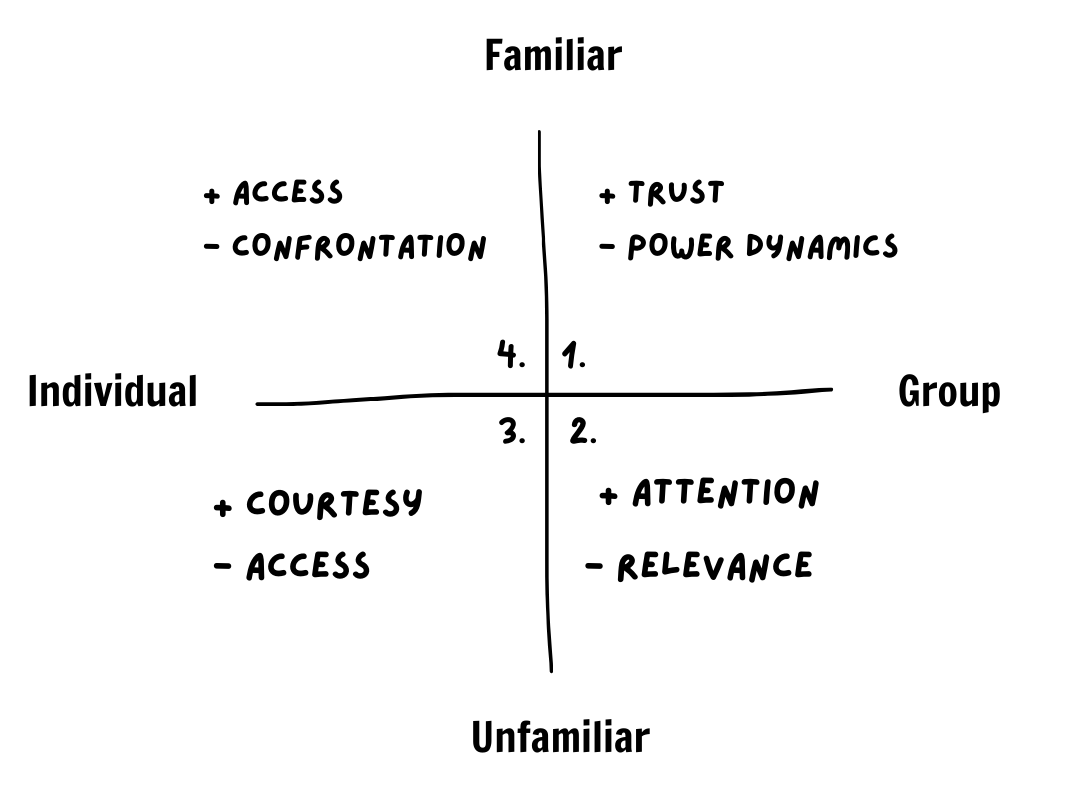Is it harder to influence people you know?

The number of people you are influencing (one Vs. many), and how familiar they are can radically alter how you approach the task.
When it comes to influencing groups, the biggest upside is scale — the sheer weight of numbers. However, you will have to manage dynamics within the group and the tendency for freeloading, which is when people feel they can hide behind the efforts of others.
Individuals have the advantage of heightened engagement — it’s harder for them to hide. However, it can feel more confronting, for both you and them.
Familiarity is both a blessing and curse. The upside is you gain access, the downside is the relationship comes with baggage.
It works like this:

1. Familiar + group
If a group is familiar with you (and you with them), they are more likely to trust you. You are part of the 'in-group' so they will be less likely to have their guard up. You can get to the point quicker.
However, with familiarity comes existing power dynamics, and these can work against your ability to influence. You will be pegged to some form of hierarchy, where some will think you are subordinate, while others defer to your positional power.
To influence them, use the credibility you already have with the group and your insights into the prevailing dynamics and issues. Focus your efforts on getting those who other people follow onside first.
2. Unfamiliar + group
When a group is unfamiliar with you (and you with them), they are likely to be a little wary because you haven’t yet built trust. First impressions are important because they will judge you in those initial moments.
To influence the group, use your outsider status and 'fresh pair of eyes' to establish authority. They will respond better if you work 'with' them rather than have something done 'to' them, so make sure you emphasise why what you are talking about is relevant to them.
3. Unfamiliar + individual
When it comes to individuals, if they are not familiar with you the challenge will be gaining access in the first place. It’s easy to fob off a stranger who cold calls, for example.
Once you do gain access, you will probably both be on your best behaviour, treading carefully. Don’t mistake their politeness for agreement, though. They may simply not want to be rude in refusing you.
Your aim in this situation is to gain their interest and establish your credibility. That means doing what you say you’ll do and not pushing too hard. Give without expecting to get anything in return. This helps you build goodwill which they may eventually reciprocate.
4. Familiar + individual
Trying to influence someone who is familiar to and with you is its own challenge. Yes, you can probably gain access to them but there is more at stake. There is nowhere to hide, so it can feel confrontational, particularly if you are asking them to change their way of doing things.
Your aim is to get them to think what you are proposing is their idea. Bring to mind things they themselves have said about the issue so they feel heard and that what you are suggesting is consistent with their perspective.
You'll find more on this, including examples of how to manage each quadrant, in The Williams Behaviour Book.

